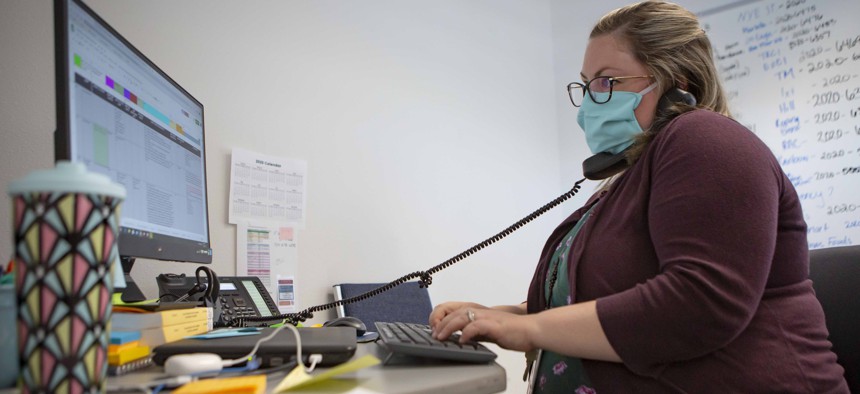Surgeon General Nominee: Time to Rebuild Local Health Departments

A staff member at the Umatilla County Public Health Department COVID-19 contact tracing center in Pendleton, Ore. in July 2020. AP Photo/Ben Lonergan
"We cannot afford to be caught in the same position we are in now, with an infrastructure that is fragmented, with data systems that don't talk to each other, with personnel that are overtaxed."
As he spoke to a group of mayors via Zoom video on Friday, President Biden's surgeon general nominee, Vivek Murthy, spent time discussing some of the immediate, pressing issues states and localities are dealing with as they battle the Covid-19 pandemic, particularly efforts to get more people vaccinated against the disease.
But Murthy, who previously served as surgeon general during the Obama administration, also highlighted another concern, one that is more forward looking: the need to strengthen local public health departments so that they are better prepared for future crises beyond the current one. He noted, as other experts have during the past year, that many city and county health departments suffered cuts during the last recession, back around 2008, and have never fully recovered.
Survey findings the National Association of County and City Health Officials released last summer indicate that, in 2008, local health departments had 5.2 full-time staff for every 10,000 people they served, whereas in 2019, they had only 4.1. The association also reported that, in 2019, 15% of health departments saw their budgets shrink compared to the prior fiscal year and 52% had flat funding.
The coronavirus outbreak, Murthy said, highlights the need for investments to help bolster atrophied staffing levels and upgrade outdated technology within these agencies.
"There could not have been a stronger case for building and strengthening our public health infrastructure than this pandemic," Murthy said. "We have to take a hard look and say, not only, 'how do we support local government in the short term?' But, 'how do we rebuild these departments of health and our public health infrastructure for the long-term?' Because god forbid another pandemic comes our way in a few years."
Murthy pointed out that as the nation has moved to carry out crucial programs like testing people for the virus and tracing who has come into contact with those infected with it, the responsibility has often fallen on local health authorities. "We cannot afford to be caught in the same position we are in now, with an infrastructure that is fragmented, with data systems that don't talk to each other, with personnel that are overtaxed and under-supported," he said.
Richmond, Virginia Mayor Levar Stoney, who led the discussion, part of the U.S. Conference of Mayors' annual winter meeting, which is happening online this year, welcomed Murthy's comments—during which the surgeon general nominee also emphasized the new administration's support for providing more federal financial aid to states and localities to help them get through the public health crisis.
"That is music to the ears of many, many mayors from around the country," Stoney said.
On the vaccine, Murthy, who is still awaiting Senate confirmation, said conversations he and others on Biden's team had with vaccine-makers, even before the election, gave him a degree of confidence that the number of available doses would "steadily increase over the next few months." He also said the Biden administration would respond to feedback from state and local officials that there isn't enough timely information about when they will receive vaccine supplies.
Rather than four or five days, state and local officials would prefer a few weeks notice from the federal government so they can plan for administering the vaccine, he explained. "We heard that loud and clear." To this end, Murthy told the mayors that in the coming weeks they should expect to see more information about the status of vaccine supplies and when more doses will be shipped their way.
Many states and localities are eager for more of the vaccine, as initial supplies of it have been limited. Getting more Americans inoculated represents a key to getting day-to-day life and the nation's economy functioning normally again. "Supply, supply, supply that's a number one concern right now," said New York City Mayor Bill de Blasio, who also participated in Friday's online session. "Maximize it, so we really can reach our people quickly."
Bill Lucia is a senior reporter for Route Fifty and is based in Olympia, Washington.
NEXT STORY: Ski Patrol Before Teachers? States Criticized Over Vaccine Timelines






